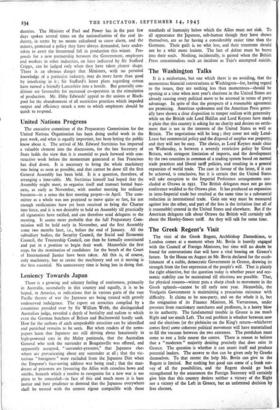The Washington Talks
It is a misfortune, but one which there is no avoiding, that the momentous financial conversations at Washington—for, having regard to the issues, they are nothing less than momentous—should be opening at a time when next year's elections in the United States are already causing every political move to be assessed in terms of party advantage. In spite of that the prospects of a reasonable agreement are promising. American spokesmen and the American Press gener- ally have shown a clear disposition to temper realism with generosity while on the British-side Lord Halifax and Lord Keynes have made it plain that this country is asking for no charity and desires no settle- ment that is not in the interests of the United States as well as Britain. The negotiations will be long ; they cover not only Lend- Lease but commercial policy and the disposal of surplus war property; and they will not be easy. The choice, as Lord Keynes made clear on Wednesday, is between a severely restrictive policy by Great Britain, with stringent limitation of imports, and the development by the two countries in common of a trading system based on normal trade practices and liberal tariff policies, and resulting in a general expansion of world trade. The case in favour of the latter, if it can be achieved, is conclusive, but it is certain that the United States will take exception to the Imperial Preference arrangements con- cluded at Ottawa in 1932. The British delegates must not go into conference wedded to the Ottawa plan. It has produced an expansion in intra-Imperial trade but resulted at the same time in a substantial reduction in international trade. Gain one way must be measured against loss the other, and part of the loss is the irritation (not all of it reasonable) created in the United States and elsewhere. But if the American delegates talk about Ottawa the British will certainly talk about the Hawley-Smoot tariff. An they will talk for some time.


























 Previous page
Previous page